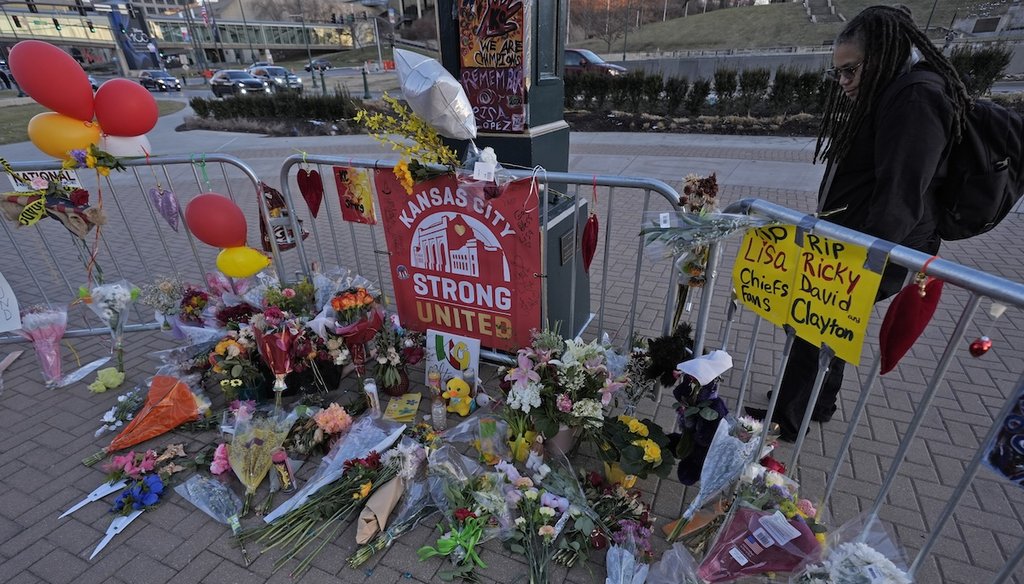Stand up for the facts!
Our only agenda is to publish the truth so you can be an informed participant in democracy.
We need your help.
I would like to contribute

A person views a memorial dedicated to the victims of last week's mass shooting in front of Union Station, Sunday, Feb. 18, 2024, in Kansas City, Mo. (AP)
If Your Time is short
-
Four people, two adults and two minors, have been charged in the Feb. 14 Kansas City Chiefs Super Bowl parade shooting. Local authorities haven’t identified the juvenile suspects in accordance with Missouri law.
-
By contrast, Kyle Rittenhouse was 17, and identified in news coverage, when he was arrested in 2020 for fatally shooting two men and wounding another in Kenosha, Wisconsin. Wisconsin law states that all 17-year-old defendants are charged and prosecuted as adults. In adult court, defendants’ names are made public.
-
Journalism ethics experts said regardless of what local authorities report, newsrooms should weigh a minor’s right to privacy and the public’s right to know when deciding whether to identify juvenile defendants.
- Our mission: Help you be an informed participant in democracy. Learn more.
In the aftermath of the Kansas City Chiefs Super Bowl parade shooting, some social media users wondered why local authorities and news outlets have not released certain information about the juvenile suspects.
One of them was Kyle Rittenhouse, who was 17 when he was arrested in the high-profile fatal shootings of two men during a 2020 protest in Kenosha, Wisconsin. He was acquitted of charges in 2021.
"I am trying to comprehend why the government was quick to reveal my name after I defended myself, but they still haven’t released the names of the Kansas City shooters," Rittenhouse posted Feb. 20 on X.
Authorities charged four people, two adults and two minors, in connection with the Feb. 14 shooting in Kansas City, Missouri.
Several other social media users besides Rittenhouse saw a double standard between the details released in this shooting — the adult suspects are Black, while the juveniles’ races are unknown — and other high-profile, but noncriminal, incidents involving white minors. They mentioned Nick Sandmann, a high schooler whose encounter with a Native American man went viral in 2019, and Holden Armenta, a 9-year-old who was criticized by the news outlet Deadspin for wearing black and red face paint and a Native American headdress to a 2023 Chiefs game.
All of these cases involved different circumstances that determined whether identifying information about the minors was released. For example, Missouri law does not allow for juvenile defendants to be identified, except in more severe criminal cases, while Wisconsin law treats all 17-year-olds as adults in criminal prosecutions.
Regardless of whether local authorities release identifying information about minors, four journalism ethics experts told PolitiFact that newsrooms must consider the ethics of publishing such details.
The Jackson County Prosecutor’s Office said an argument and gunfire broke out at the Chiefs’ Super Bowl parade, leaving one woman dead and 22 other people, most of them children, injured.
Lyndell Mays, 23, and Dominic M. Miller, 18, were arrested on charges of second-degree murder, armed criminal action and unlawful use of a weapon.
On Feb. 16, before the adult suspects were publicly identified, Jackson County Family Court said two juveniles were arrested on gun-related and resisting arrest charges. No further details about the juveniles have been released.
Juvenile court records are typically not disclosed to the public under Missouri law.
"They shouldn’t have their lives derailed because of one bad decision," said Clark Peters, a University of Missouri associate professor specializing in criminal and juvenile justice.
The ultimate decision to identify a juvenile suspect in Missouri lies with the juvenile court judge, Peters said.
If juveniles are charged with a felony, such as murder, a judge may decide to prosecute them as adults. In this case, a judge may decide to allow identifying information about minors to be publicly released.
The two juveniles involved in the Kansas City shooting have not been charged with felonies. The Jackson County Family Court said additional charges were expected as the local police investigation continues, but the court did not say who may be charged or what the charges may be.
Rittenhouse claimed he acted in self-defense when shooting three people during a night of protests in Kenosha. In November 2021, a jury found him not guilty on counts of first-degree intentional homicide, first-degree reckless homicide, first-degree attempted intentional homicide and two counts of first-degree reckless endangerment.
Rittenhouse was prosecuted as an adult under Wisconsin law, which requires all 17-year-old criminal defendants to be charged and prosecuted as adults. In adult court, the criminal defendant’s name is publicly released at the time of arrest.
In Sandmann’s case, there was no crime. His name rose to national prominence because of a 2019 viral video that showed an encounter between Sandmann, then a Covington Catholic High School student, and a Native American protester.
Sandmann sued several news organizations, including The Washington Post, USA Today publisher Gannett Co. and CNN, for damages following media coverage of the event. Sandmann privately settled with The Washington Post and CNN; the lawsuit involving Gannett was dismissed.
Armenta also went viral online because of a photo taken of him during a Chiefs football game. Soon after, Deadspin ran a story accusing Armenta — without naming him — of wearing blackface. Deadspin included a photo of Armenta showing only half his face, which was covered in black paint. (The other half not seen in the photo was painted red.)
The child’s family is suing Deadspin for defamation. Deadspin has since updated the story to remove the photo and mentions of Armenta.
When deciding to name a minor suspect, news organizations should weigh a person’s right to privacy and the public’s right to know, said Kellie Stanfield, an associate professor of broadcast journalism at the University of Missouri.
John Watson, an associate professor of communications law and journalism ethics at American University, said this is especially important to prioritize minimizing harm when children are involved.
"The potentially massive and long-term harm to children is probably never ethically justified given that they should not be held to the same standards of publicized accountability as newsworthy adults," Watson said.
Experts said some of the questions journalists should consider are:
-
Does the public need to know the minor’s identity? Why or why not?
-
Would shielding the minor’s identity lead to public harm?
-
Does releasing the minor’s identity give readers a deeper understanding of the context of the story?
"Each circumstance, obviously, is different and might change what a journalist would ultimately decide to do. But the key thing … is to remind oneself that we are dealing with human beings and not just reporting information," said Aly Colón, a media ethics professor at Washington and Lee University.
Journalists should also be transparent with the public about this decision-making process, said Kathleen Culver, professor and director of the Center for Journalism Ethics at the University of Wisconsin-Madison.
"Oftentimes, newsrooms can be so insular. We’re just having these discussions of ethics among ourselves, rather than inviting people from the outside into the conversation," Culver said. "If you are transparent with your audience about why you make those decisions, it’s going to result in more trust of your organization, not less."
Our Sources
Interview with Clark Peters, a University of Missouri associate professor specializing in criminal and juvenile justice, Feb. 22, 2024
Interview with Aly Colón, a media ethics professor at Washington and Lee University, Feb. 23, 2024
Interview with Kathleen Culver, journalism ethics professor and director of the Center for Journalism Ethics at the University of Wisconsin-Madison, Feb. 23, 2024
Email interview with Kellie Stanfield, an associate professor of broadcast journalism at the University of Missouri, Feb. 22, 2024
Email interview with John Watson, an associate professor of communications law and journalism ethics at American University, Feb. 22, 2024
Kyle Rittenhouse, X post, Feb. 20, 2024
X post, Feb. 19, 2024
Instagram post, Feb. 20, 2024
Instagram post, Feb. 20, 2024
Instagram post, Feb. 19, 2024
Instagram post, Feb. 22, 2024
Kansas City Star, "Fewer details made public in Chiefs rally shooting charges than in past juvenile cases," Feb. 20, 2024
NPR, "Kyle Rittenhouse is acquitted of all charges in the trial over killing 2 in Kenosha," Nov. 19, 2021
Cincinnati Enquirer, "March for Life: Where things stand now for Nick Sandmann and CovCath," Jan. 23, 2020
Mediaite, "Deadspin walks back article accusing Chiefs fan of wearing blackface: 'We regret any suggestion that we were attacking the fan,’" Dec. 8, 2023
Jackson County Prosecutor’s Office, "Two men charged in the shootings outside Union Station after Chiefs rally," Feb. 20, 2024
Jackson County Prosecutor’s Office, Charging documents for Kansas City Super Bowl parade shooting, Feb. 20, 2024
Jackson County Family Court news release about juveniles charged, Feb. 16, 2024
Missouri Statute on juvenile court records, accessed Feb. 23, 2024
Wisconsin Legislative Council, "Juveniles in Adult Criminal Court," March 2023
Milwaukee Journal Sentinel, "How Wisconsin law treats children accused of homicide in adult court," Nov. 30, 2022
The Associated Press, "Students in 'MAGA' hats mock Native American after rally," Jan. 20, 2019
CNN, "The Washington Post settles lawsuit with Nick Sandmann after viral March for Life controversy," July 24, 2020
Deadspin, "(ARCHIVED) The NFL needs to speak out against the Kansas City Chiefs fan in Black face, Native headdress," Nov. 27, 2023
Deadspin, "The NFL must ban native headdress and culturally insensitive face paint in the stands (UPDATED)," updated Dec. 7, 2023
New York Post, "Family of 9-year-old Kansas City Chiefs fan accused of blackface sues Deadspin for defamation," Feb. 7, 2024
The Associated Press, "Key events in the Kenosha shootings case of Kyle Rittenhouse," Nov. 19, 2021
The Associated Press, "2 juveniles charged in mass shooting at the Kansas City Chiefs Super Bowl parade," Feb. 16, 2024
Student Press Law Center, "Naming names: Identifying minors," Jan. 29, 2020
Louisville Courier Journal, "Judge dismisses former Covington Catholic student's libel suit over viral Capitol incident," July 27, 2022




























